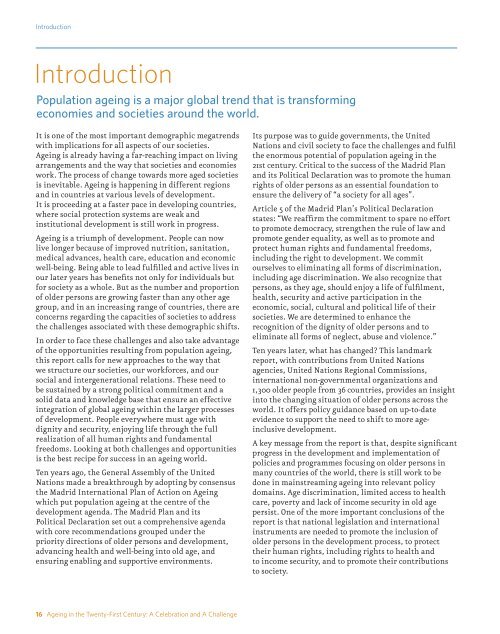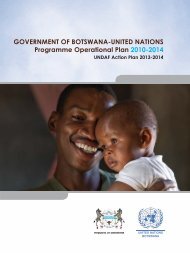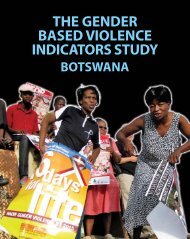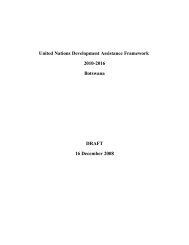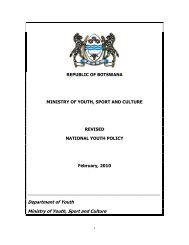Ageing in the Twenty-First Century: - HelpAge International
Ageing in the Twenty-First Century: - HelpAge International
Ageing in the Twenty-First Century: - HelpAge International
You also want an ePaper? Increase the reach of your titles
YUMPU automatically turns print PDFs into web optimized ePapers that Google loves.
Introduction<br />
Introduction<br />
Population age<strong>in</strong>g is a major global trend that is transform<strong>in</strong>g<br />
economies and societies around <strong>the</strong> world.<br />
It is one of <strong>the</strong> most important demographic megatrends<br />
with implications for all aspects of our societies.<br />
<strong>Age<strong>in</strong>g</strong> is already hav<strong>in</strong>g a far-reach<strong>in</strong>g impact on liv<strong>in</strong>g<br />
arrangements and <strong>the</strong> way that societies and economies<br />
work. The process of change towards more aged societies<br />
is <strong>in</strong>evitable. <strong>Age<strong>in</strong>g</strong> is happen<strong>in</strong>g <strong>in</strong> different regions<br />
and <strong>in</strong> countries at various levels of development.<br />
It is proceed<strong>in</strong>g at a faster pace <strong>in</strong> develop<strong>in</strong>g countries,<br />
where social protection systems are weak and<br />
<strong>in</strong>stitutional development is still work <strong>in</strong> progress.<br />
<strong>Age<strong>in</strong>g</strong> is a triumph of development. People can now<br />
live longer because of improved nutrition, sanitation,<br />
medical advances, health care, education and economic<br />
well-be<strong>in</strong>g. Be<strong>in</strong>g able to lead fulfilled and active lives <strong>in</strong><br />
our later years has benefits not only for <strong>in</strong>dividuals but<br />
for society as a whole. But as <strong>the</strong> number and proportion<br />
of older persons are grow<strong>in</strong>g faster than any o<strong>the</strong>r age<br />
group, and <strong>in</strong> an <strong>in</strong>creas<strong>in</strong>g range of countries, <strong>the</strong>re are<br />
concerns regard<strong>in</strong>g <strong>the</strong> capacities of societies to address<br />
<strong>the</strong> challenges associated with <strong>the</strong>se demographic shifts.<br />
In order to face <strong>the</strong>se challenges and also take advantage<br />
of <strong>the</strong> opportunities result<strong>in</strong>g from population age<strong>in</strong>g,<br />
this report calls for new approaches to <strong>the</strong> way that<br />
we structure our societies, our workforces, and our<br />
social and <strong>in</strong>tergenerational relations. These need to<br />
be susta<strong>in</strong>ed by a strong political commitment and a<br />
solid data and knowledge base that ensure an effective<br />
<strong>in</strong>tegration of global age<strong>in</strong>g with<strong>in</strong> <strong>the</strong> larger processes<br />
of development. People everywhere must age with<br />
dignity and security, enjoy<strong>in</strong>g life through <strong>the</strong> full<br />
realization of all human rights and fundamental<br />
freedoms. Look<strong>in</strong>g at both challenges and opportunities<br />
is <strong>the</strong> best recipe for success <strong>in</strong> an age<strong>in</strong>g world.<br />
Ten years ago, <strong>the</strong> General Assembly of <strong>the</strong> United<br />
Nations made a breakthrough by adopt<strong>in</strong>g by consensus<br />
<strong>the</strong> Madrid <strong>International</strong> Plan of Action on <strong>Age<strong>in</strong>g</strong><br />
which put population age<strong>in</strong>g at <strong>the</strong> centre of <strong>the</strong><br />
development agenda. The Madrid Plan and its<br />
Political Declaration set out a comprehensive agenda<br />
with core recommendations grouped under <strong>the</strong><br />
priority directions of older persons and development,<br />
advanc<strong>in</strong>g health and well-be<strong>in</strong>g <strong>in</strong>to old age, and<br />
ensur<strong>in</strong>g enabl<strong>in</strong>g and supportive environments.<br />
Its purpose was to guide governments, <strong>the</strong> United<br />
Nations and civil society to face <strong>the</strong> challenges and fulfil<br />
<strong>the</strong> enormous potential of population age<strong>in</strong>g <strong>in</strong> <strong>the</strong><br />
21st century. Critical to <strong>the</strong> success of <strong>the</strong> Madrid Plan<br />
and its Political Declaration was to promote <strong>the</strong> human<br />
rights of older persons as an essential foundation to<br />
ensure <strong>the</strong> delivery of “a society for all ages”.<br />
Article 5 of <strong>the</strong> Madrid Plan’s Political Declaration<br />
states: “We reaffirm <strong>the</strong> commitment to spare no effort<br />
to promote democracy, streng<strong>the</strong>n <strong>the</strong> rule of law and<br />
promote gender equality, as well as to promote and<br />
protect human rights and fundamental freedoms,<br />
<strong>in</strong>clud<strong>in</strong>g <strong>the</strong> right to development. We commit<br />
ourselves to elim<strong>in</strong>at<strong>in</strong>g all forms of discrim<strong>in</strong>ation,<br />
<strong>in</strong>clud<strong>in</strong>g age discrim<strong>in</strong>ation. We also recognize that<br />
persons, as <strong>the</strong>y age, should enjoy a life of fulfilment,<br />
health, security and active participation <strong>in</strong> <strong>the</strong><br />
economic, social, cultural and political life of <strong>the</strong>ir<br />
societies. We are determ<strong>in</strong>ed to enhance <strong>the</strong><br />
recognition of <strong>the</strong> dignity of older persons and to<br />
elim<strong>in</strong>ate all forms of neglect, abuse and violence.”<br />
Ten years later, what has changed? This landmark<br />
report, with contributions from United Nations<br />
agencies, United Nations Regional Commissions,<br />
<strong>in</strong>ternational non-governmental organizations and<br />
1,300 older people from 36 countries, provides an <strong>in</strong>sight<br />
<strong>in</strong>to <strong>the</strong> chang<strong>in</strong>g situation of older persons across <strong>the</strong><br />
world. It offers policy guidance based on up-to-date<br />
evidence to support <strong>the</strong> need to shift to more age<strong>in</strong>clusive<br />
development.<br />
A key message from <strong>the</strong> report is that, despite significant<br />
progress <strong>in</strong> <strong>the</strong> development and implementation of<br />
policies and programmes focus<strong>in</strong>g on older persons <strong>in</strong><br />
many countries of <strong>the</strong> world, <strong>the</strong>re is still work to be<br />
done <strong>in</strong> ma<strong>in</strong>stream<strong>in</strong>g age<strong>in</strong>g <strong>in</strong>to relevant policy<br />
doma<strong>in</strong>s. Age discrim<strong>in</strong>ation, limited access to health<br />
care, poverty and lack of <strong>in</strong>come security <strong>in</strong> old age<br />
persist. One of <strong>the</strong> more important conclusions of <strong>the</strong><br />
report is that national legislation and <strong>in</strong>ternational<br />
<strong>in</strong>struments are needed to promote <strong>the</strong> <strong>in</strong>clusion of<br />
older persons <strong>in</strong> <strong>the</strong> development process, to protect<br />
<strong>the</strong>ir human rights, <strong>in</strong>clud<strong>in</strong>g rights to health and<br />
to <strong>in</strong>come security, and to promote <strong>the</strong>ir contributions<br />
to society.<br />
16 <strong>Age<strong>in</strong>g</strong> <strong>in</strong> <strong>the</strong> <strong>Twenty</strong>-<strong>First</strong> <strong>Century</strong>: A Celebration and A Challenge


